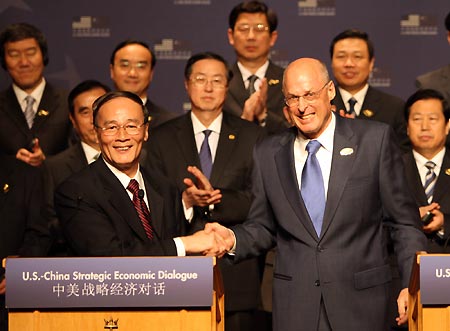
Visiting Chinese Vice Premier Wang Qishan (front L) shakes hands with US Treasury Secretary Henry Paulson (front R) at the opening ceremony of the 4th round of China-US Strategic Economic Dialogue in Annapolis, Maryland, the United States of America, June 17, 2008. China and the United States on Tuesday started here their 4th round of Strategic Economic Dialogue.
China and the United States pledged to further and expand mutual cooperation at the 4th round of their Strategic Economic Dialogue (SED) on Tuesday.
"Due to the complicated, changeable nature of the current global economic and financial situation, both China and the US are facing a lot of challenges. Holding the 4th SED under such circumstances will have special significance for us to enhance mutual strategic trust, deepen economic and trade cooperation, and respond jointly to challenges," visiting Chinese Vice PremierWang Qishansaid at the opening session of the meeting.
Wang listed three proposals for this round of dialogue.
The first is to adhere to the topics of the meeting and expand consensus.
"Those topics reflect the major issues facing our two nations and basically cover the areas that have strategic and long-term impact for both our countries," Wang said.
He stressed energy and environment as a new growth area for bilateral economic cooperation, where China and the US have many common interests and broad prospects.
Secondly, Wang said both countries needed to take each other's concerns into consideration and adopt a long-term perspective.
"China is the world's largest developing nation whereas the US is the largest developed nation, and our economies are mutually complementary," he noted.
Wang said it is important to avoid politicizing the trade issue, which complicates the matter.
He pointed out that China has made solid progress in opening up its financial sector, in intellectual property rights protection, in product quality and food safety, in exchange rate system reform and in easing trade imbalance.
Owing to China's development level and the situation it faces, however, some problems will need a long time to solve, Wang admitted.
Finally, he said both sides needed to strengthen the SED mechanism and increase mutual strategic trust.
Wang emphasized that no matter what happens, both countries need to continue making a good use of the SED as an important platform of cooperation.
"The US-China economic relationship has become central to each nation's interest and to maintaining a stable, secure and prosperous global economic system," said US Treasury Secretary Henry Paulson.
"Through the ongoing, dynamic and respectful discussions of the SED, the relationship is growing in a positive direction. The SED has brought concrete progress on issues important to the US, the Chinese and the global economy faster than would have been possible otherwise," he added.
Paulson said the meeting will build on previous progress, "including landmark agreements on food, feed and product safety announced at our December SED meeting in Beijing."
"We will have a robust discussion on our economic relationship as we envision a future of sustainable economic growth," he said.
Wang and Paulson are co-chairing the meeting as special representatives of the state leaders of the two countries.
Participants at the two-day meeting include minister-level officials and other senior officials from the two governments.
The meeting features a series of sessions focusing on various topics.
The discussions will highlight five specific areas: financial and macro economic management, developing and protecting human capital, the benefits of trade and open markets, enhancing investment, and advancing joint opportunities for cooperation in energy and environment.
(Xinhua News Agency June 18, 2008)